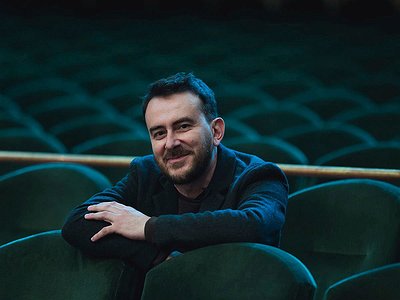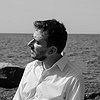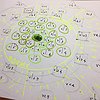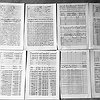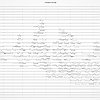Part 1
Name: Vito Palumbo
Occupation: Composer
Nationality: Italian
Current release: Vito Palumbo's Woven Lights is out via BIS.
Recommendations:
1. “Atmosphere” by G. Ligeti
2. “Ossi di Seppia” by E. Montale (poems)
If you enjoyed this Vito Palumbo interview and would like to stay up to date with his music, visit his official website. He is also on Instagram, Facebook, twitter, and Soundcloud.
When I listen to music, I see shapes, objects and colours. What happens in your body when you're listening? Do you listen with your eyes open or closed?
My relationship with sound was created as a child. It has developed unconsciously since I was born, as a natural and physiological fact, like the need to breathe, walk, eat …
The “sound image”, the vision of sound, has always been a fundamental aspect of my life that has allowed me to develop a very individual and personal musical thought, right from the first compositional experiments. It has allowed me to slowly build what one might call “style”, with great effort and over a long period of time until today. It has evolved over the years going through various stages of experimentation and research, to arrive at what I now consider something truly consolidated in my poetics.
There is a substantial difference between poetics and aesthetics and the desire to transform my expression into something abstract has led me to focus on a much more intimate and private aspect of the creative process: absolutely towards a very personal poetics, intimate inner research.
Therefore, the listening experience involves an immersion in my interiority, giving shape to the sounds through colours, objects, and shapes that arise from the music, which themselves represent the sounds and the music, giving them a name and an identity, creating a more direct association "sound-shape". But as a composer I happen to proceed in the opposite direction, that is, I already have images, colours, and visions within me which I then translate into sounds.
My body is constantly connected to this creative and imaginative dimension, as if I were always immersed in sound thanks to what I hear and see inside me. Closing my eyes to connect with my sound dimension doesn't have much relevance: I can do it to not be influenced by the surrounding reality but I can also have my eyes open and still see everything my imagination wants to see.
I could define this as “daydreaming”, which for me is the greatest power of music.
What were your very first steps in music like - and how do you rate gains made through experience versus the naiveté of those first steps?
I never realized the precise moment at which music became part of my life. I have always felt that it was something already present within me. It was a natural transition from the first approach to the serious study of music in the conservatory. When I was studying I didn't have any difficulties, everything came easy to me, and that's why I understood that music would become my profession as well as my passion.
I was a very active child, with a rich imagination. I always wanted to reproduce or invent melodies looking for the right sounds on the piano. Progress came spontaneously and naturally because I was careful in researching these sounds, that is, I always wanted to choose the "best way" to obtain a more effective and satisfying result, what I would call an awareness of taste. This care in managing sounds has always accompanied me with an ever-greater awareness over the years and in the natural process of maturation.
During my musical life, I have also taken many naive steps, creating works that I have now cancelled from my catalogue: I don't believe that the path of a composer should also highlight the wrong tests and should include everything without distinction. The pieces that don't represent me or that I consider now as "mistakes" have only been useful for personal growth, for taking steps up to an important point that marks a worthy evolutionary moment.
The arrival points (which coincide with the departure or restart points) mark the true path of a composer, considering them in their consequentiality. What is found between one step and another is superfluous and it can be eliminated because it does not clarify an explicit stylistic evolution, what is present in this space must only be known by the composer.
Many tell me that I am very strict with myself for having this firm belief. But I think it is necessary severity in clarifying the right path of my voice within the multitude of voices of the world. For me, clarity in the stylistic transformation or evolution is fundamental, considering only the successful trials throughout life.
According to scientific studies, we make our deepest and most incisive musical experiences between the ages of 13-16. What did music meant to you at that age and what’s changed since then?
In my journey at the age of 13-16, there was obviously an important passage of growth and awareness of my musical abilities and aptitudes. But I've always seen my approach to music as a game, it still is and even more. I have always liked playing with sounds even though it was around that age that I realized that music is also a game made up of "rules", rules that must be built from scratch when something original has to be created, rules that come from analysis or exercises when you have to study and learn.
But I felt deeply about music even before that age, I remember listening to many records of great classical composers, I was moved and felt a strong emotion to the point of crying with joy or sadness, on many occasions. From just listening I perceived an internal and profound order in the musical discourse, things that I totally ignored and could not explain but which I somehow recognized through a natural intuition.
Gradually this awareness has strengthened over the years until today. What before I could only instinctively intuit now I can control more and with a different consciousness. The technical ability and the craftsmanship in musical writing have allowed me to fully understand the musical content and also the distinctive signs of what I can define as a style, instruments that now belong to me.
The importance of technique is essential for reaching musical maturity and luckily, I was able to fully understand this concept thanks to the great composers I studied with, my teachers, Azio Corghi and Luciano Berio.
Over the course of your development, what have been your most important instruments and tools and how have they shaped your perspective on music?
The “tool” (so to speak) that made my life easier in writing has always been my imagination. I think imagination is an innate gift that no one can learn or teach anyone. Craftsmanship slowly refines what you instinctively create or recreate. It is something even more intimate and personal that could hardly be explained in words, perhaps it is a question of a need to externalize an inner energy that is governed by a sense of balance and rightness.
In my opinion, this tool is not genetically modifiable in any way. How and why does this happen? Hard to say ... you get to touch a truly intimate part that moves and chooses a certain path for you rather than another one in the conception of a musical idea. It's like breaking down an atom and seeing why subatomic particles behave the way they do. Who can tell? We can only observe the result and take note of it.
This is for me an "innate tool", like a gene programmed with precision for a well-defined evolution over time but we cannot intervene, modify or refine the quality of this gene. It is not possible to make this creative spark better: in the initial phase of life, it may or may not work.
On the other hand, the "tools acquired" during the period of study, and beyond, constantly shape an intuition, an idea and can refine it through the control of many musical parameters. Having a precise image of how to render a certain colour through a meticulous dosage of various instruments (or electronic sounds) means having technical control over the orchestration.
I can say that this aspect has greatly shaped my idea of music over the years and decades, making it much more abstract and detailed today than in the past, precisely because we are talking about a modifiable parameter, which can be improved over time, which can be refined through study and the analysis of many authors of the past and present.
What, would you say, are the key ideas behind your approach to music and what motivates you to create?
Going back to the previous answer, the key ideas for me can be defined in archetypes that come from the ancient world and from more abstract extramusical concepts.
There are well-established musical archetypes by now, in anthropological terms. They can appear in an original work dressed in new clothes thanks to the orchestration or well-hidden by complex writing. The archetype is the fulcrum of the idea and it can refer to something more concrete, it can have a more or less clear semantic value (which does not necessarily involve the use of a literal or stylistic quotation). The key idea can be disguised at various gradients and levels, it can be made recognizable and referable to something already heard so that the listener can feel at ease and less disoriented.
But today my spirit of adventure has led me to distance myself from the archetype that comes from history and from which I drew in the compositional experiences of the past. These "new sounds" that I am looking for (if they can ever be defined like this) for me come from an idea of the universe, of cosmic events and they are connected in some way to the fascinating world of astronomy. A world away from our lives, from our daily lives, but a world that we are still part of even if we don't realize it.
I imagine a sound world that comes from dreams, from that part of our subconscious that is lost in an idea of infinity, eternity, and mystery. Where do I want to look for humanity in all of this? In poetry that can arise from an abstract key idea and that has allowed me to slowly and painstakingly build my own archetype.
The idea of "light-sound" which goes beyond the already widely investigated idea of the colour of sound, introduces for me a new expression and therefore an absolute and universal poetic message, which in the end is linked to humanity and existential problems of the human being. After all, my music, by exploring this intimate secret casket (where microcosm coincides with macrocosm), wants to express an ethical sense, a spiritual, ideal, utopian but a not necessarily mystical idea.
I am still looking for technical tools that can clarify this sense of "sound light" and that can spontaneously express the poetic aspect only through music (without a verbal explanation).
Paul Simon said “the way that I listen to my own records is not for the chords or the lyrics - my first impression is of the overall sound.” What's your own take on that and how would you define your personal sound?
I would define my sound as placed in space rather than time. I adore Ligeti's music which helps me to think about many aspects of new music and how to interpret in music many events connected to time and space (concepts that we find abundantly in themes of astronomy, physics and chemistry). Well, my point today is an idea where sounds are placed and distributed in space rather than time.
It might seem contradictory to speak only of space in music because we know that music unfolds and develops over time (I find Ligeti's music concentrated more on the idea of complex tempo and metric, polyrhythm and polymetric, elements that we find abundantly in his works). Instead, I try to imagine my psycho-perceptive idea of the musical form more oriented in space, where we don't have events that follow one another in series but rather connected in a neuronal network, in various points further away and closer, as if they were nodes located in a 3-dimensional space.
So somehow I want to make an image of music perception in which time almost slows down (in some cases it stops) and all the events are present together in a common whole, "visible" aurally at the same instant as if they were crystallized in a sound painting or sound sculpture.
Obviously, this is an address that I emphasize above all on a psychological and philosophical level: time must necessarily flow anyway but while it does I try to focus attention (thanks to the spatialization of writing) on a more predominant perception of space, through the placement of sound objects and textures at different points that suggest a sense of perspective within a very varied, rich and complex sound field. It's just a psychological perception but for me it's enough to say new things.




